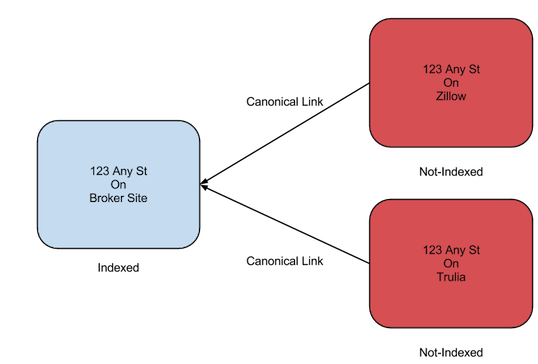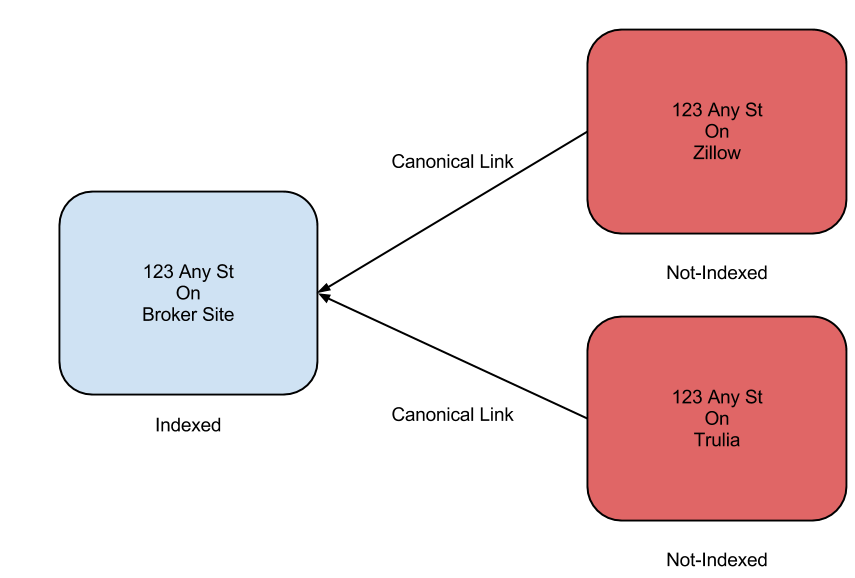This week, there have been multiple conversations about how Realtors / Brokerages should force Zillow, Trulia, and Realtor.com to use both authorship and canonical links on listings. I want to take a minute and explain first what these are, and why this is a really big deal that should be carefully considered before acting. Please consider passing this post on via social media channels or using the email link below to other Realtors, MLS execs, etc.
What is Google Authorship?
A few years back, some very smart people at Google recognized something: they had all of these great posts but no way of knowing really who wrote them and if you liked the writer or not. Heavily optimized content was more valuable than good clean writing and sites like eHow starting gaining millions of pageviews for mundane topics. Google realized that when you’re looking for good content, you want to know who the person is that wrote it and build an affinity with that individual. So they created something that was originally called AgentRank (now called Google Authorship ). The idea was simple, figure out a way to tie an individual post to the person that wrote it. Soon after Google+ was launched they then had a way to tie in the content with the person that wrote it. Have a special tag on each post you write link back to your Google+ page with a special tag rel=”author”
Learn About Our New Ads and Leads Program - TRIBUS Engage
The correct way to display that is some HTML on your pages that look like this:
Just to make sure people weren’t saying you wrote the post when you really didn’t, Google also implemented an authentication that required you to provide a link to the site you write on via your Google+ profile page. The benefit is that your posts then appear differently in Google and Google builds an affinity between the content you read and the writer that writes it. Have you ever seen a Google result that looked like this?

That’s Google Authorship in action.
What Are Canonical Links?
To understand canonical links, you have to understand that content posted in two places is bad. We see this all of the time with other real estate website vendors. They sell agents on the content library of 1000 posts they have available. This is known as duplicate content or cross-site duplicate content. Another thing we see often is systems that push posts down to your site that are the same across all of their sites or just change a few words, such as putting your city name into the post. Google recognizes this and in most caes will not index this content. If enough content on your site is copied from other sources, it can derank your entire site as being spammy. This process is called Content Spinning.
Learn About Our New Ads and Leads Program - TRIBUS Engage
Google knew that there were cases where you might want to have content in two places on your site legitimately though and has given you a way to tell them what’s more important.
Simply put, canonical links provide Google with a way to see where content originated. For example, let’s say I write a post on my site, but I post it both on my page about Maine and my page about Bangor, Maine. So that Google understands which page you want to get the credit, you can place a link back to that page on the page you don’t want to get the credit.

However, this can also be used across sites. So for example, you can place your content on another domain and provide canonical links back to the source and your original site will get the credit. It’s a great way to make sure you’re getting all of the Google juice you deserve for your unique content. Here’s an example of the link you’d put on the page you didn’t want to get the value with the link there being where you do want to get the credit:
Authorship On Syndication Sites
There are voices out there calling for Zillow, Trulia, and Realtor.com to provide an authorship tag on each listing to the broker that provided it. That way it indicated to Google who provided the information. But to understand this is to know there are two major issues with it:
- Each broker or individual Realtor would have to go to their Google+ page and provide links in the contributor section to Zillow, Trulia, and Realtor.com Otherwise Google would not pick up this information due to the authentication I mentioned was necessary above. I don’t see many people doing this.
- If anything, due to poor SEO management of most Realtors’ sites, this will do nothing but help Zillow, Trulia, and Realtor.com rank HIGHER. What this would effectively do is anyone in a Realtor’s circle will see ZTR listings before their own site since most agents don’t have authorship setup on their own sites and Google sees more domain authroity in the big sites instead of the individual real estate agent sites. So this method would do nothing but help them instead of helping the Realtor.
Canonical Links On Syndication Sites
The much bigger issue here though is a canonical links on these sites. By forcing ZTR to post a canonical link from their sites back to the broker’s website who has the listing, the syndicators would lose large volumes of traffic overnight.
Learn About Our New Ads and Leads Program - TRIBUS Engage
As I mentioned above, by placing canonical links on a page, Google effectively doesn’t pay attention to it and instead gives credit to the originating site. Where does this leave ZTR? Well, my best guess is that between 40-50% of their traffic comes from organic real estate SEO. That means overnight, businesses that rely on ad revenue as their primary generator of cash would lose 50% of their income with no reduction in expenses.

In a market, Zillow charges say $1000 a month because they get 50,000 pageviews for that ad (a Cost Per Thousand or CPM of $50). If, suddenly their ads were shown 50% less, they’d have to lower their rates by 50%. Something else to know here though is that the $50 CPM premium that Zillow commands is because the people viewing those ads are all interested in real estate (general CPM for broad casting is $10-20 or less). So if they aren’t getting people interested in listings anymore they’d have to lower their CPM down as well. So not only did impressions go down for the ad, but the dollar per impression went down! Perhaps, I’m seeing this wrong, but this appears to be a doomsday scenario for these sites. And in fact, it might be the one way that NAR could get out of their agreement with Move, Inc. for the use of Realtor.com if unique users go below 500,000.
Learn About Our New Ads and Leads Program - TRIBUS Engage
(Tangent: Did you know that Move, Inc has an evergreen agreement to operate Realtor.com? NAR can’t cancel the agreement unless 1 of 4 things happen: Directly from Move, Inc’s 10K -“Although the REALTOR.com® operating agreement is a perpetual agreement, the NAR may terminate it for a variety of reasons. These include: the acquisition of us or RealSelect by another party without the NAR’s consent;if traffic on the REALTOR.com® site falls below 500,000 unique users per month;a substantial decrease in the number of property listings on our REALTOR.com® site; and a breach of any of our other obligations under the agreement that we do not cure within 30 days of being notified by the NAR of the breach.” )
Move, Inc, Trulia, and Zillow are all publicly traded companies. They have an obligation to their shareholders to do what’s in the company’s best interest and that means fighting this tooth and nail. I see only a few options if these rules are passed: Getting the DOJ involved with NAR / MLSs again and claiming anti-competitive practices from the MLS or attacking the Realtor business model. And while mobile is definitely gaining traction for these sites, SEO still plays a part. Clients are out looking for homes, type in an address, and ZTR pops up. This is part of the huge rise in mobile stats that they have experienced. More importantly, these companies have already considered these scenarios, they know what to do if this happens. You’re not as smart as Spencer and Pete while having a 10k disclosure statement about the risks of the business without having a contingency plan.
And so, while I am a Realtor, and know and believe that Realtors own the listings that are displayed on these sites, I just point out that this is worth a group discussion instead of arbitrary rules being passed.

